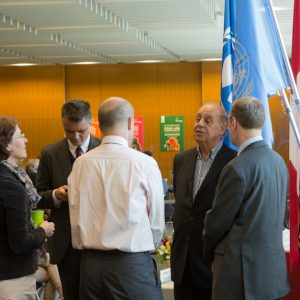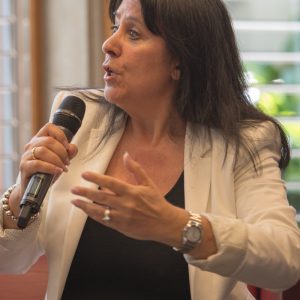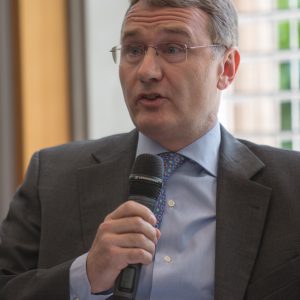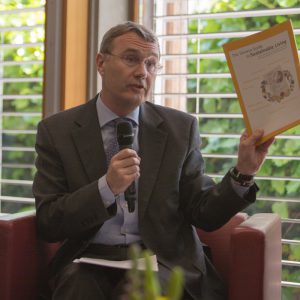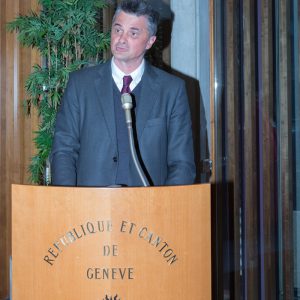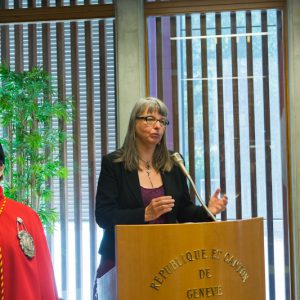Event
World Environment Day Roundtable | Think.Eat.Save. | Reduce your footprint
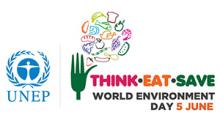
05 Jun 2013
10:00–13:00
Venue: International Environment House 2
Organization: Geneva Environment Network
The theme for 2013 World Environment Day celebrations was Think.Eat.Save. Reduce your foodprint! Think.Eat.Save is an anti-food waste and food loss campaign of the Save Food Initiative that encourages you to reduce your foodprint. The campaign is a partnership between UNEP, FAO and a rapidly growing list of partners from the public and private sector, and supports the UN Secretary-General’s Zero Hunger Challenge. It draws attention both to the issue and the absurdity that high volumes of perfectly edible produce are never making it from the farm to the fork.
We live in a world of plenty, where food production outstrips demand, yet 870 million people are undernourished and childhood stunting is a silent pandemic. According to the UN Food and Agriculture Organization (FAO), every year 1.3 billion tonnes of food is wasted. This is equivalent to the same amount produced in the whole of sub-Saharan Africa. At the same time, 1 in every 7 people in the world go to bed hungry and more than 20,000 children under the age of 5 die daily from hunger. To create the future we want, we must correct this inequity.
At least a third of everything we grow on this planet is lost between the field and the consumer. It is an ethical, economic and environmental issue given the enormous waste of energy, water, fertilizers and other inputs as a result of food that is produced but never eaten. The campaign seeks to add its authority and voice to these efforts in order to galvanize widespread global, regional and national actions and catalyze more sectors of society to be aware of and to act on the growing scandal of food waste.
If food is wasted, it means that all the resources and inputs used in the production of all the food are also lost. For example, it takes about 1,000 litres of water to produce 1 litre of milk and about 16,000 litres goes into a cow’s food to make a hamburger. The resulting greenhouse gas emissions from the cows themselves, and throughout the food supply chain, all end up in vain when we waste food.
Infrastructure and technology can reduce the amount of food that perishes after it is harvested and before it reaches the market. Developing country governments can work to improve essential infrastructure and maximize trade opportunities with neighbours; developed nations can support fair trade and rationalize sell-by dates and other labelling systems; businesses can revise their criteria for rejecting produce; and consumers can minimize waste by buying only what they need and re-using left-over food.
A roundtable took place at the International Environment House on 5 June 2013, to discuss what needs to do be done to make change happen and the role policymakers, civil society and opinion leaders will have to play.
Panel
Michele Candotti, Principal Adviser to UNEP Executive Director
Ann Tutwiler, Special Representative of FAO Director-General
Dominique Kohli, Deputy Director of the Swiss Federal Office for Agriculture
Claus Conzelmann, Nestlé Head of Safety, Health and Environmental Sustainability
Jean Ziegler, Former UN Special Rapporteur on the right to food
Moderator: Elisabeth Byrs, WFP Spokesperson
Programme
10:00 ROUNDTABLE
12h20: OFFICIAL SPEECHES
Michele Candotti, Principal Adviser to UNEP Executive Director
Martine Rohn-Brossard, Deputy Head of the International Affairs Division, FOEN
Michèle Kunzler, State Councillor of the Republic and State of Geneva
12h30: RECEPTION
More information
Detailed programme WED celebrations in Geneva available from: www.jme-ge.ch

